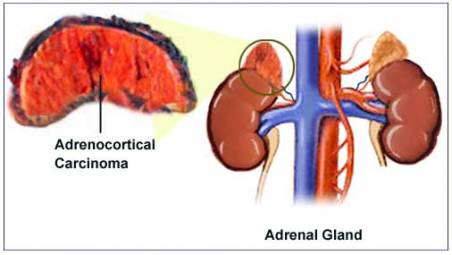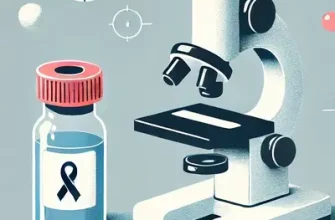These glands, positioned atop the kidneys, produce hormones responsible for controlling different bodily functions. Signs of adrenal gland cancer may involve stomach discomfort, loss of weight, and hormonal irregularities. Detecting and treating this disease early on is vital for enhancing the chances of a better prognosis.
Stages of Adrenal Gland Cancer and Their Signs
Here are the stages of adrenal gland cancer along with their signs:
Stage 1:
- Normally, the detection of adrenal gland cancer does not occur during this initial phase.
- The tumor is limited to the adrenal gland and has not extended to surrounding tissues or lymph nodes.
- As a result, there may not be any noticeable signs or symptoms.
Stage 2:
- The malignant tumor starts to increase in size and has the potential to infiltrate surrounding tissues or organs like the liver or kidney.
- Signs and symptoms may start to appear, such as abdominal pain or a noticeable mass in the abdomen.
- There are some people who might also undergo a decrease in weight, alterations in their appetite, or an elevation in their blood pressure.
Stage 3:
- The tumor continues to grow and may invade nearby lymph nodes.
- Symptoms become more pronounced, including persistent pain in the abdomen or back.
- Other signs may include unexplained weight loss, fatigue, nausea, and hormonal imbalances, such as excessive hair growth in women or feminization in men.
Stage 4:
- Adrenal gland cancer has spread to distant organs or tissues beyond the adrenal glands and nearby lymph nodes.
- Metastasis commonly occurs in the liver, lungs, or bones.
- Symptoms become more severe and may include jaundice, difficulty breathing, bone pain, and fractures.
- Hormonal imbalances may intensify, leading to rapid changes in body appearance, weight, and emotional state.
Early detection and appropriate treatment can significantly improve the outcome and quality of life for individuals diagnosed with adrenal gland cancer.
Most Effective Treatment Methods for Adrenal Gland Cancer
This type of cancer requires a comprehensive and individualized treatment plan, taking into consideration various factors such as the stage of cancer, overall health of the patient, and the size and location of the tumor. Here is a guide to the most effective treatment methods for adrenal gland cancer:
- Surgery: In most cases, surgery is the primary treatment for adrenal gland cancer. The goal of surgery is to remove the cancerous tumor along with surrounding tissues, lymph nodes, and nearby organs if necessary. The type of surgical procedure depends on the size and stage of the tumor. Adrenalectomy, where the affected adrenal gland is removed, may be performed either through open surgery or minimally invasive laparoscopic surgery.
- Chemotherapy: Chemotherapy may be recommended before or after surgery to kill cancer cells or shrink the tumor. The drugs are usually administered intravenously or orally, and the treatment may involve multiple cycles. Chemotherapy is often used in advanced stages of adrenal gland cancer to reduce symptoms and improve the quality of life.
- Radiation therapy: Radiation therapy uses high-energy X-rays or other forms of radiation to destroy cancer cells or shrink the tumor. It may be used in combination with surgery and chemotherapy in certain situations. Radiation therapy is typically delivered externally through a machine or internally using small radioactive materials placed near the tumor.
- Targeted therapies: Targeted therapies are a newer form of cancer treatment that specifically target cancer cells while causing minimal damage to healthy cells. These therapies work by blocking the growth and spread of cancer cells through the interference of genetic or molecular changes that aid in cancer growth. Some targeted therapies used in adrenal gland cancer include mitotane, sorafenib, and sunitinib.
- Clinical trials: Participation in clinical trials may be an option for some patients. Clinical trials offer access to experimental treatments that are not yet widely available and can provide an opportunity to contribute to advanced cancer research. Discussing the possibility of clinical trials with your healthcare team can help determine if it is a suitable option for your condition.
- Supportive care: Alongside the primary treatments, supportive care is crucial in managing the side effects of treatment and maintaining the patient’s overall well-being. This may include pain management, nutritional support, psychological counseling, and social support services.
Regular follow-up appointments and close monitoring are crucial to assess the treatment’s effectiveness and detect any potential recurrence.
Patients’ Stories
Patient Story 1: Sarah’s Journey with Treatment for Adrenal Gland Cancer
Sarah was a vibrant and active woman in her early 40s when she was diagnosed with adrenal gland cancer. It came as a shock to Sarah and her family, but she was determined to fight this disease head-on.
After consulting with a team of oncologists and specialists, Sarah started her treatment plan, which included surgery to remove the tumor from her adrenal gland. The intricate surgery went smoothly, and Sarah’s medical team was able to successfully remove the cancerous growth.
Following surgery, Sarah’s oncologist recommended a combination of radiation therapy and chemotherapy to target any remaining cancer cells. Radiation therapy involved using high-energy beams to destroy cancer cells, while chemotherapy utilized drugs to kill cancer cells throughout her body.
Sarah started her radiation therapy sessions, which were generally painless but left her feeling fatigued. She persevered, knowing that this treatment was crucial in ensuring the cancer did not return.
In addition to radiation therapy, Sarah underwent several rounds of chemotherapy. The treatment caused side effects such as nausea, hair loss, and a weakened immune system. Sarah found comfort and support through a dedicated support group for cancer patients, which helped her navigate these tough times.
Despite the challenges she faced, Sarah remained positive and determined to beat the odds. She made sure to follow a healthy diet, exercise regularly, and attend all her medical appointments.
Months turned into years, and Sarah’s perseverance paid off. Regular scans showed no signs of cancer recurrence, and she slowly regained her strength and energy. Sarah’s journey with treatment for adrenal gland cancer had been tough, but the experience taught her the importance of resilience and hope.
Patient Story 2: Mark’s Experience with Cutting-Edge Immunotherapy for Adrenal Gland Cancer
Mark was in his late 50s and had known for years that he had an adrenal gland tumor. However, when the tumor began to show signs of malignancy, he knew it was time to seek treatment.
Mark’s oncologist recommended a novel approach to treatment: immunotherapy. This cutting-edge therapy aimed to stimulate his immune system to recognize and attack the cancer cells.
Mark started a series of immunotherapy treatments, administered through intravenous infusions. These treatments utilized antibodies specifically designed to target and inhibit proteins expressed by the cancer cells, thereby boosting his immune response against the tumor.
Initially, Mark experienced some mild side effects such as fatigue, flu-like symptoms, and skin rashes. However, these were manageable, and his medical team closely monitored his progress.
Over time, Mark noticed a significant improvement in his condition. Regular check-ups and scans indicated a reduction in tumor size, giving him renewed hope. He continued with the immunotherapy sessions, and each session became more tolerable as his body adjusted to the treatment.
Mark’s treatment journey was not without its challenges, but he remained optimistic. He made sure to take care of himself physically and emotionally, seeking support from his loved ones and participating in counseling sessions.
As the months went by, Mark’s tumor continued to shrink, and eventually, it disappeared completely. He celebrated this milestone with his family and medical team, knowing that immunotherapy had played a vital role in his successful treatment for adrenal gland cancer.









